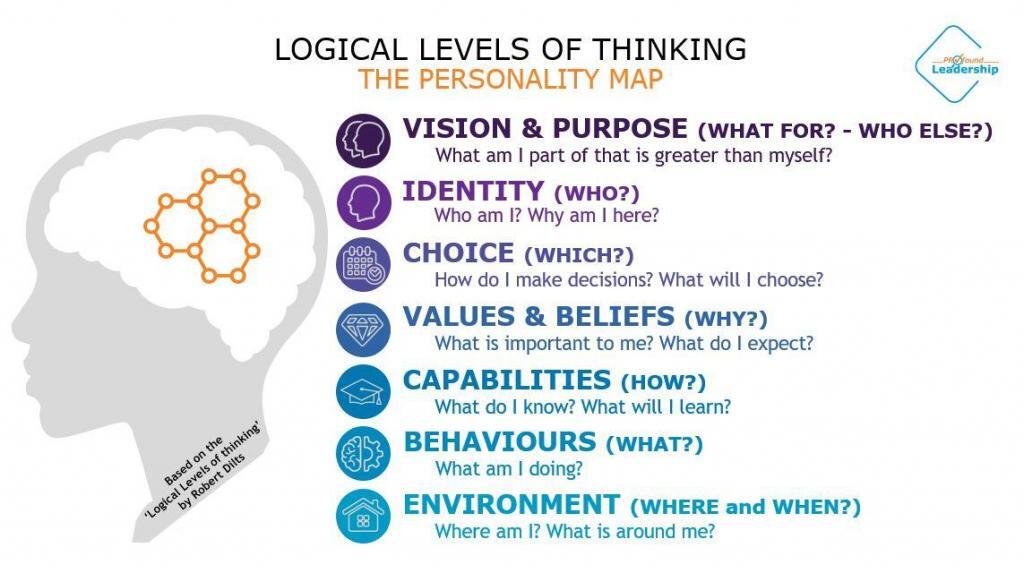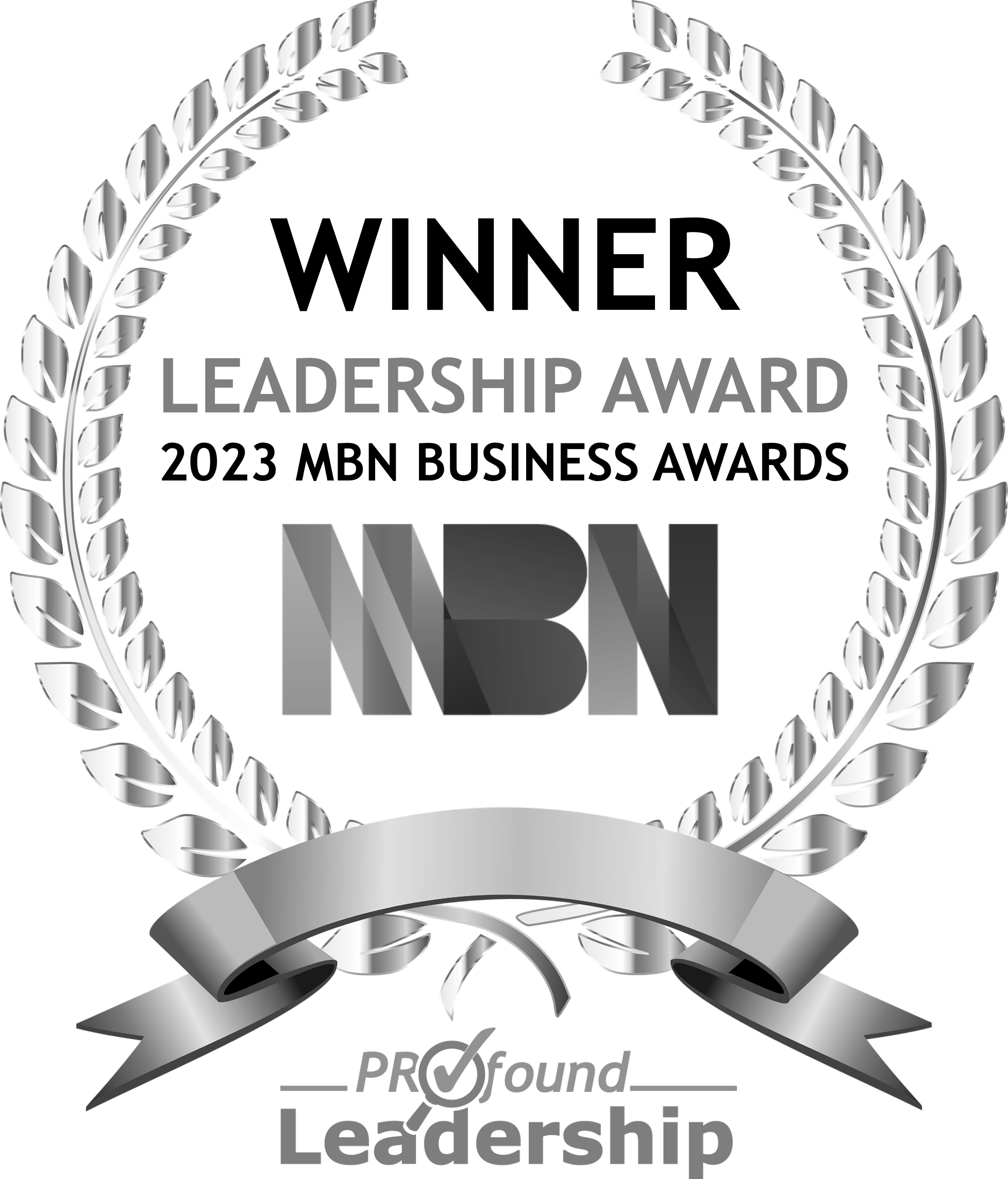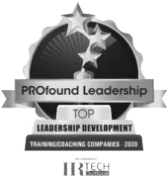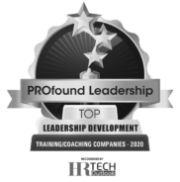7 Logical Levels to finally understand your employees

[5 min read]
How to pinpoint challenges and undesirable behaviours and successfully promote change.
Today, we would like to introduce you to the ‘Logical levels’ leadership concept. This powerful model provides us with great insights and structure into our communication with others, and helps us understand other human beings we can support them in reaching their full potential.
The ‘Logical Levels of Thinking’ were originally developed by Robert Dilts. However, based on our extensive experience working with a variety of clients over many years, we took the liberty of adding one additional crucial level, Choice. These ‘Logical levels’ are a powerful way to successfully tackle and promote change, by breaking it down into different categories of information. It also demonstrates how various levels interact and relate to each other to accommodate:
- Keeping track of a vast amount of information in a structured way when dealing with challenges
- Organising our thinking, information gathering, and communication
- Understanding ‘what makes people tick’ and the relevance of the information provided
- Identifying at which logical level the issue occurs
- Recognising the most appropriate level of where a solution should be installed

Associating logical levels is beneficial not only to the enhancement of one’s own ability to learn and grow, but also to the ability of others to learn and grow. The Logical Levels map the seven different groups of how we think, feel, act and make decisions. We can use them to pinpoint what a person’s challenges and undesirable behaviours are the result of.
- Environment: negative responses to their surroundings
(For example: workplace, home, classroom etc.) - Behaviour: adopting unresourceful actions
(For example: disruptive actions, creating tension etc.) - Capability: not having appropriate skills to do something
(For example: lack of skills, knowledge etc.) - Values & Beliefs: not being able to motivate themselves and/or having certain negative beliefs around issues which are getting in their way
(For example: violation of values, limiting beliefs “I can’t do it” or “It’s too hard”) - Choice: making irrational choices that sabotage positive outcomes
(For example: not completing tasks, not showing up to work etc.) - Identity: considering that it is something that doesn’t fit in with their self-image
(For example: “Working in a corporate job is boring” or “Confident behaviour is a sign of self-absorption.”) - Vision & Purpose: not recognising how their work or hobbies contribute to their life vision
(For example: “I am not sure how this job will benefit me in the future.” or “Why should I do Professional Development? It’s not gonna change the world!”
Let’s reflect on that for a moment.
How do you define yourself? Do you think of yourself mainly in terms of what you do (Behaviours)? Or the skills you have (Capabilities)? Or by what’s important to you (Values) and what you believe? Or by who you are as a person (Identity)? Or do you define yourself in terms of your purpose, or being part of something that’s bigger and more important than you are?
If employees don’t know how else to act or behave, they may need to learn new skills that will assist them to demonstrate more resourceful behaviours. Perhaps, the employee needs to learn more about confident conflict management, effective communication skills, stress management, or interpersonal skills. - If the employee believes that their behaviours are acceptable because it is the only possible way in their circumstances, then it’s time to challenge the employee’s beliefs and get clarity on their values. And if their values and beliefs are core to their identity, then it’s time to reconsider who the employee is and how they want to be perceived by others, or their purpose and reason of being within this workplace.
Logical Levels – Organised thinking tool
The ‘Logical Levels’ are an amazing tool to solve complex problems. And Complex Problem Solving was identified as one of the major skills of the future at a recent World Economic Forum after all!
This model is a fantastic instrument to organise our thinking about an individual, a group or even an organisation. Let us explain how the 7 Logical Levels work when attempting to understanding ourselves, and how they can assist you in finally understanding your employees:
- Environment includes the external conditions and is our foundation level. It provides us with opportunities as well as external threats. This is where we are at any given time (where we work, study, and live including the people in our life, who we interact with and respond to.)
The fundamental questions are: Where am I? What is around me?
- Behaviours are our actions or reactions within our environment. They include posture, movements, etc. and what people in our environment would see, hear and feel when we are engaging with them. On this level, the emphasis is on the person’s thoughts, action and what influenced the individual (through either self or others).
The fundamental question is: What am I doing?
- Capabilities form the basis for the behavioural actions or inactions. Capability is what we know how-to and are able to do (our skills and knowledge). So, our behaviours are based on our capability to act in a certain way, how we are dealing with any given life situations and how effectively we use them.
The fundamental questions are: What do I know? What will I learn?
- Values & Beliefs provide the reinforcement that supports or denies our capabilities. It considers the motives behind our behaviours, the underlying standards and values we have towards ourselves, and how we judge and compare.
The fundamental questions are: What is important to me? What do I expect?
- Choice is the level where we draw a line in the sand between what has always been (past experiences that shaped our current values & beliefs) through social obligations and conditioning, and what can become (creating a new identity and positioning ourselves through soul-searching and truly understanding who we want to be). Choice enables us to evolve and live our true authentic self.
The fundamental questions are: How do I make decisions? What will I choose?
- Identity determines our overall being and shapes our values & beliefs. On this level, the emphasis is on our sense of self, our personal pursuit of a higher purpose in life and what we identify ourselves with in the role as employer, team leader, employee, husband, wife, friend etc.
The fundamental questions are: Who am I? Why am I here
- Vision and purpose relate to how we are part of a larger system that reaches beyond ourselves as individuals to our family, community and global systems, to give us inspiration and spirituality. On this level, the emphasis is on wisdom. It explores where you are going with your life. With which people. Which activities and places are central in this vision for your life/future - and, perhaps, the contribution you intend to make to the world?
The fundamental question is: What am I part of that is greater than myself?
“You cannot solve a problem with the same kind of thinking that created it.” ~ Albert Einstein
The higher levels within this model offer more leverage. The effect of each level is to organise and direct the information on the level below. Changing something on a higher level will automatically change things on the lower levels; changing something on a lower level can, but won’t necessarily, affect the upper levels.
This is why many employees and workplaces prove to be unsuccessful when addressing issues and problems. They often only focus on the behaviour and capability levels within a certain environment. We perhaps learn new skills and knowledge but our values, beliefs and sense of identity, which determine whether we will use our new capabilities, don’t change. So, if you want to maximise your employees’ potential, then change has to take place at the right level to truly make a difference. The way to identify the level an individual is stuck at with an unrecognised challenge, is to listen into how the person communicates with you and pick up within their wording at what level the challenge or misalignment occurs.
The beauty of this leadership model is that it is surprisingly easy to pick up and the results are nothing short of astounding. It enables individuals to achieve their potential as well as understand and adjust patterns of thinking and behaviours. This is useful in the workplace, home and every other area of life.
“Dare to make a difference!” #WeMakeItEasy #LeadershipSkills
If you want to know more about leadership skills and Learning & Development Programs
… team up with us, and get PROfound Leadership on your support team!
AUTHOR

Martin Probst - CEO (Chief Education Officer)
If you liked our blog, please feel free to subscribe HERE to ensure you receive a reminder for our upcoming posts.
Please leave your feedback below and don’t forget to share this blog with your work colleagues. So they too can benefit from it. Simply choose your preferred social media on the left.






 A 10-minute straight-to-the-point "Stress Strangler" every successful manager needs. Join our community and instantly access your FREE download (valued at $47)!
A 10-minute straight-to-the-point "Stress Strangler" every successful manager needs. Join our community and instantly access your FREE download (valued at $47)!